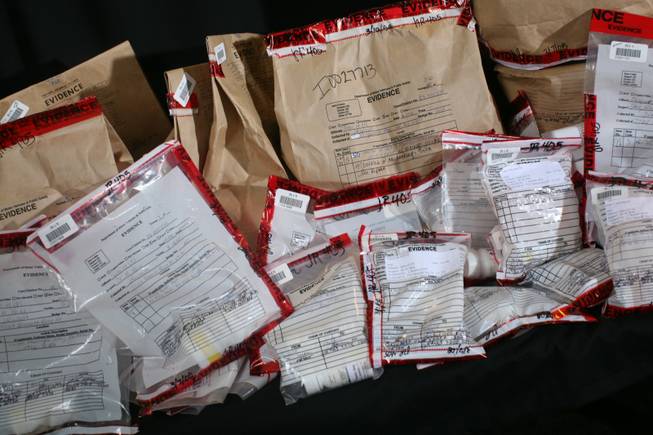
Evidence equal to more than 21,000 dosage units of prescription narcotics was confiscated as part of the 2006 criminal investigation that led to the murder trial of Dr. Harriston Bass Jr.
Wednesday, Dec. 9, 2009 | 2 a.m.
Sun Archives
- Rising use of painkiller taking deadly toll (7-7-2008)
- Doctor found guilty of murder in overdose death (3-5-2008)
Defense attorneys are arguing that a long-standing practice of the county coroner’s office provides the reason to overturn the second-degree murder conviction of a Las Vegas doctor.
On Thursday three Nevada Supreme Court justices will get an earful at the Regional Justice Center about the coroner’s handling of prescription drugs. It’s expected to be at the heart of oral arguments by defense lawyers working on behalf of Harriston Bass Jr.
Prosecutors successfully argued that though Bass was a doctor, he was acting as a drug dealer, delivering painkillers to clients through a house-call service. A jury not only convicted Bass in the October 2005 overdose death of 38-year-old Gina Micali, but also found him guilty on 49 drug-related counts involving other patients. In April 2008 he was sentenced to 25 years to life in prison, and in February his license to practice medicine was revoked by the Nevada State Board of Medical Examiners.
His attorneys will argue, though, that Bass should never have been convicted of murder because the coroner’s office, according to the testimony of one of its investigators, discarded drugs and their containers found near Micali’s body. That was office policy at the time. Though Coroner Michael Murphy would not comment on the Bass case, he said it is standard practice among coroners nationwide to discard prescription drugs in overdose deaths after the medication has been properly recorded.
Until March 2007, whenever the Clark County coroner’s office found prescription drugs while investigating someone’s death, investigators would normally round up another witness, usually a police officer. The unused medication would then be photographed and flushed down the toilet. The bottles were thrown away. The policy change more than two years ago did not stem from concerns about preserving evidence, Murphy said.
Instead, the changes were made in response to Clark County Water Reclamation District warnings about the danger unused drugs could pose to the valley’s water supply. Drugs that were going into the sewer system were winding up in Lake Mead, the source of more than 90 percent of the valley’s drinking water. Drugs were also causing the lake’s fish to mutate, researchers found. Male fish developed female ovarian tissues from exposure to birth control pills and other medication, for example.
Murphy said his office now brings the medicine back to the office and has a contractor, AET Environmental of Las Vegas, alter the drugs so that they can no longer be ingested. Ultimately, the drugs are incinerated.
But Micali died two years before the changes took effect. While arguing that Bass sold the painkiller hydrocodone to Micali two days before her death and had prescribed the drug to her, prosecutors relied on the coroner’s investigator and the photographs the investigator took of the drugs. A half-empty bottle of hydrocodone was among what was thrown away.
But the defense attorneys, Alan Johns and R. Paul Sorenson of Las Vegas, stated in briefs filed with the court that no legible photos of the discarded drugs were ever shown at trial. In fact, they argued that the destroyed evidence could have exonerated Bass by showing that those drugs were not provided to Micali by the doctor shortly before her death.
Instead, the attorneys stated that other prescription bottles subsequently found elsewhere in the residence by a relative of the victim but never admitted as evidence at the trial included the drugs Bass provided to Micali two days before her overdose.
“The inevitable conclusion is that the prosecutor presented false evidence, failed to correct it and argued it to the jury,” they wrote.
But the state, through Chief Deputy Attorney General Conrad Hafen, is sticking to its belief that Bass’ due process rights were preserved even though drugs and their bottles were discarded. Hafen wrote in his brief that the coroner’s office followed its protocol by properly recording the drugs, and that Bass had no evidence suggesting the investigator acted in bad faith.
Hafen also stated that Bass has failed to demonstrate that the destroyed drugs would have helped his defense.
“Bass cannot show that the result of the trial would have been different,” Hafen concluded.

Join the Discussion:
Check this out for a full explanation of our conversion to the LiveFyre commenting system and instructions on how to sign up for an account.
Full comments policy